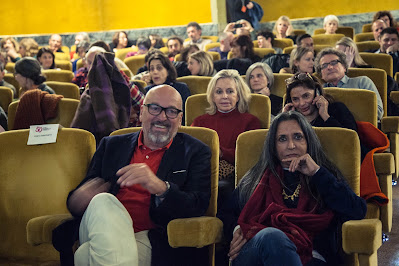'Why now, a movie version of Midnight’s Children?
I had actually more or less given up on the idea that there would ever be a film of Midnight’s Children. After all, it’s rather an old book. [Director] Deepa Mehta and I had dinner together in Toronto at the time of the publication of The Enchantress of Florence. We were talking about this and that, and possible collaborations, and discussing other novels of mine that she was interested in. And then suddenly, out of the blue, she asked about Midnight’s Children and did I have the rights. I said I did, and she said, “Can I do that instead?”
You make it sound very easy.
It took 30 years for it to be easy.
Was the plan always for you to write the screenplay?
No. In fact, initially, I said I didn’t want to. I, more or less straightforwardly, refused to do it. I thought I’d written this already. One of the things I’ve learned in the last four or five years is that if Deepa wants something badly enough, in the end she gets it.
She was determined...
She went on and on at me about it. In the end, I agreed to do it for a number of reasons. One, it was the first of my books to be filmed. Given that I loved movies, and here’s a movie being made of my book, probably it’s a good idea to dive in. I thought I might enjoy that, I might learn something from it, that it might be fun. Also, because the novel was written so long ago, I was able to be distant from it in the way that I would need to be. (...)
Were there any scenes you particularly enjoyed writing?
There’s a scene that doesn’t exist in the novel. In the novel, Shiva, Saleem’s alter-ego - who was swapped with him as a baby - never finds out about the baby-swap. In the movie, I thought, if you’re going to do something as Bollywood melodramatic as swapping babies at birth, at some point, the swapped babies have to confront each other. If I’d been sharp enough 30 years ago, I would have included that scene in the novel. (...)
Were you very involved in creative decisions during filming?
The thing I didn’t do is, I didn’t go on the shoot. I thought, I know enough about movies to know only one person directs. I also know that if you’re on a movie set without a very specific job to do, you’re the most annoying person there. And it’s also really boring. But before, and after the shoot, I was quite involved. One of the things I think is quite wonderful in the film is the production design by Dilip Mehta, Deepa’s brother. I showed him a lot of old photographs of my family so that he could get the look of that time right. I made the mistake of telling Deepa that when we were children in my grandparents’ house, one of the things that really scared us was that my grandmother had a very terrifying flock of geese. When I saw the rushes, I realized to my horror that there were the damn geese in the movie!
What was it like the first time you saw a complete version?
The first rough cut was well over four hours long. I felt that it was there, but at that point, you’re in work mode and all you see is what’s wrong. It’s the same when I’m writing a book; if I write a draft of something, when I look at that draft, I’m looking for what’s wrong and how I can fix it. Then there was a moment - Deepa keeps reminding me that I burst into tears at this point, which maybe I did and maybe I didn’t - where we saw a cut, and I felt that everything that had finally come together.
What’s it like seeing the movie with an audience?
That’s been what’s been most interesting to me. Deepa and I have now seen the film, like, 400 times each, and we don’t really need to see it again. But what I do when I sit in screenings is, I watch the audience. We showed it at [the Telluride Film Festival, where it premiered last August], and when the lights came up, there was a gentleman sitting next to me who had tears on his face. I said to him that I was sorry I made him cry - which was a lie, by the way. I was not sorry I made him cry. I was rather pleased I’d made him cry. And he said this sweet thing, he said, “No, don’t be sorry, because these are tears of beauty.” I thought, Can I take that and put it on the poster, please?
And when you’re writing a book you don’t get to see people crying or laughing.
It’s quite true. People are always telling me that they’ve seen people reading my books on the subway, or the beach, or whenever. Other people tell me they see it all the time, but somehow the world is so orchestrated that I never get to see it. So this time, of course, it’s been very delightful to actually be able to watch from the back of the hall'.
















